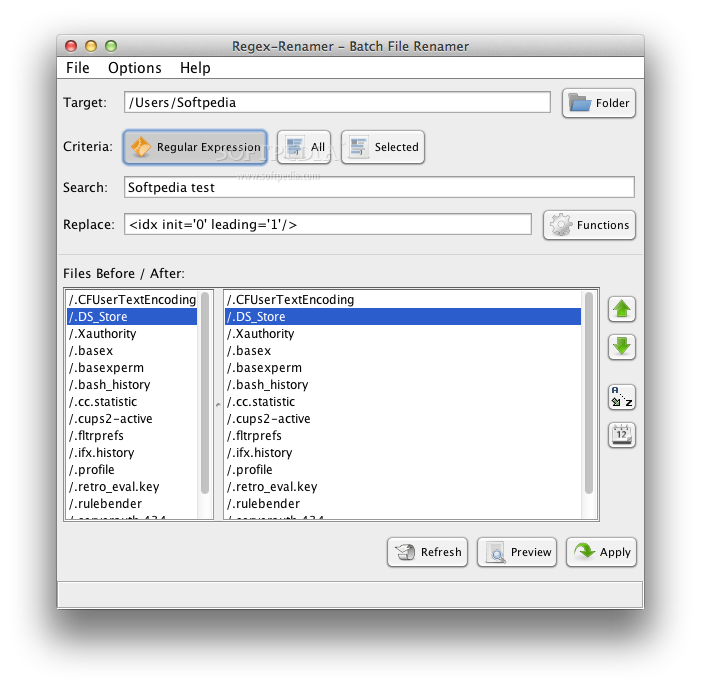

- #BASH FILE MASS RENAME REGEX HOW TO#
- #BASH FILE MASS RENAME REGEX INSTALL#
To replace the spaces with underscores in the names of all the files in the current directory, all you have to do is to use renam command in this way: rename 's/ /_/g' * The rename command will be pretty handy here. Naturally, you would want to remove the spaces and replace them with an underscore (_). This is why no experienced user ever names a file with spaces in it. It’s a nightmare to handle spaces in filenames in Linux. Imagine if you have white spaces in several filenames. Scenario 1: Replace a Character With Another in all the Filenames in Linux Let me show two practical scenarios where this command will save you a lot of time.
#BASH FILE MASS RENAME REGEX HOW TO#
Now you must be wondering how to rename files with the rename command.
#BASH FILE MASS RENAME REGEX INSTALL#
If you are a sudo user in Ubuntu or Debian, you can use this command to install rename: sudo apt install rename
-s : Do not rename the symlink but its targetĭo note that rename command is not a standard utility that are pre-installed on the Linux distributions like mv or cp command. Show the files that would be renamed but don’t rename the files. This 'rename command' has the following options: This is the syntax rename command follows: rename perlexpr The rename command only works on the filename, not the file itself. There is a command line utility called rename that allows you to rename all the files that match a certain pattern in Perl regex form. You can use the find exec command option with the mv command to automate this process.īut let me tell you an even simpler way of renaming files based on regex pattern. Using mv command one by one would take plenty of time and should surely be avoided. That’s the standard way after all.īut what about the situation where you have to rename several files. 

The same mv command is used for renaming directories as well. You simply use it in the format: mv old_file_name new_file_name
This will work for Windows: > dir /b | vim - then type %s/.*/move \"&\" \"&.OLD\"/ if you want to append OLD to the end of the file for example.I believe you already know how to rename files in Linux with mv command. Probably should generalize by adding a section for Windows. vidir, emv, qmv external tools which works with vim. renamer.vim plugin to list and rename files. You can also visually select a small subset of lines, and only execute those commands:Īgain, this will replace the selected lines with the command's output which can be useful for some commands. This will also replace the file with the command's output, which is useful for commands besides mv. This will pipe the whole buffer to the system command bash, thus executing all of the move commands. Sure there are utilities that may do this better, but Vim is always available and that's one less thing you have to remember.Īn alternative method of executing the commands is: So if you started with a list of 100 file names, it will execute 100 mv commands. The reason this works is Vim writes a file line-by-line. You can use any Vim features here ( macros are useful), as long as each line results in a valid shell command. Note: In case the file name contains space character, it should be surrounded with quotes. 
To substitute certain text in the filename: We need to change each line to be a valid stand-alone shell command.įor example, to rename the files to lowercase: In Vim you now have one file name per line. Vim will open, displaying a list of file names. The backslash tells your shell to disregard any aliases for ls we need plain output with no color. Starting at a shell prompt, you can send a list of file names to the standard input of Vim by entering:







 0 kommentar(er)
0 kommentar(er)
